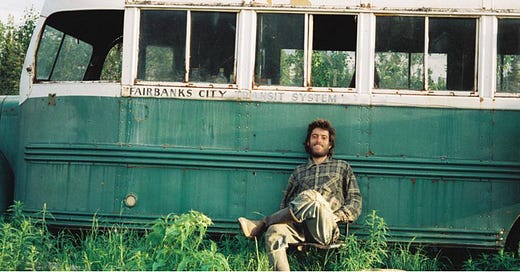476. Cap a terres salvatges (4)
Seguint amb un altre poema que apareix a la pel·lícula, pren una certa rellevància “I go back to May 1937” de Sharon Olds, inclós a “The gold cell” (1987). És aquest un poema que expressa la decepció dels fills davant d’uns pares que no assoliran les seves espectatives. Christopher McCandless fa bandera d’un codi moral rígid que el portarà a aillar-se dels seus perquè no serà capaç de perdonar-los certs errors; i serà aquest mateix codi moral que (paradoxalment) l’acostarà a d’altres estranys que el valoraran justament per la seva integritat. De fet, fuig d’uns pares que no representen els seus valors fonamentals, tot i que davant d’aquesta rebeldia hi endevinem un sentiment de pena profund inexpressat (al final de la pel·lícula ens adonarem que pare i fill comparteixen el costum de no portar mitjons, un lligam secret al que el protagonista no voldrà renunciar). El poema és prou profund i prou tràgic per donar-li aquí el pes que té. He trobat disponible l’escena on surt recitat, i també deixo la transcripció en anglès i una possible traducció al castellà.
“I see them standing at the formal gates of their colleges,
I see my father strolling out
under the ochre sandstone arch, the
red tiles glinting like bent
plates of blood behind his head, I
see my mother with a few light books at her hip
standing at the pillar made of tiny bricks,
the wrought-iron gate still open behind her, its
sword-tips aglow in the May air,
they are about to graduate, they are about to get married,
they are kids, they are dumb, all they know is they are
innocent, they would never hurt anybody.
I want to go up to them and say Stop,
don’t do it—she’s the wrong woman,
he’s the wrong man, you are going to do things
you cannot imagine you would ever do,
you are going to do bad things to children,
you are going to suffer in ways you have not heard of,
you are going to want to die. I want to go
up to them there in the late May sunlight and say it,
her hungry pretty face turning to me,
her pitiful beautiful untouched body,
his arrogant handsome face turning to me,
his pitiful beautiful untouched body,
but I don’t do it. I want to live. I
take them up like the male and female
paper dolls and bang them together
at the hips, like chips of flint, as if to
strike sparks from them, I say
Do what you are going to do, and I will tell about it.”
“Los veo ante la entrada principal de sus universidades.
Veo a mi padre pasear bajo el arco ocre de arenisca,
las tejas rojas brillando como platos doblados de sangre tras su cabeza.
Veo a mi madre con unos libros ligeros en su cadera,
junto al pilar de pequeños ladrillos, con la verja de hierro forjado
aún abierta tras ella, sus puntas afiladas en el aire de Mayo.
Van a licenciarse. Están a punto de casarse.
Son unos críos, son tontos.
Sólo saben que son inocentes y que jamás lastimarían a nadie.
Quiero acercarme a ellos y decirles: “Alto, no lo hagáis.
Que ella es la mujer equivocada, que él es el hombre equivocado,
que vais a hacer cosas que ni imagináis.
Que vais a hacer cosas malas a niños.
Que vais a sufrir de forma inimaginable.
Que vais a querer morir.
Quiero acercarme en la luz de Mayo, y decíroslo.
Pero no lo hago.
Quiero vivir.
Os tomo como muñecos de papel,
y os froto uno contra el otro por las caderas como a esquirlas de pedernal,
como si quisiera sacaros chispas.
Y digo: Haced lo que vais a hacer, que yo lo contaré.”
Nota de l’autor: aquest article forma part d’una sèrie de 5 sobre el llibre i la pel·lícula. Si et venen de gust són aquests: 1, 2, 3, 4 i 5.




